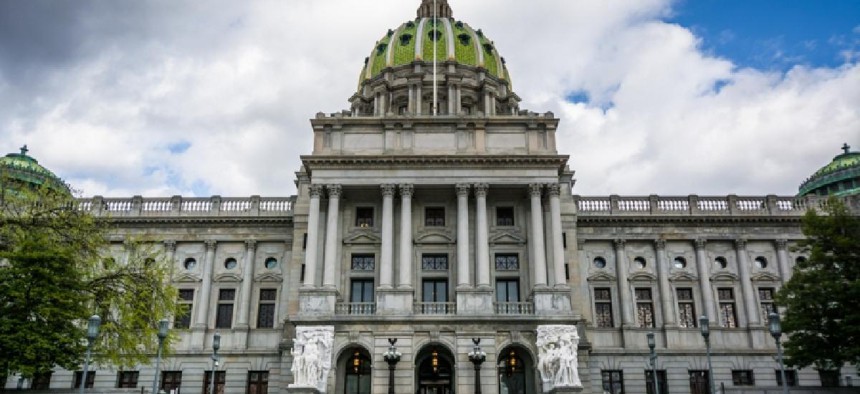Infrastructure
House returns to session to begin budget balancing act

After taking a roughly seven-week session hiatus, the state House of Representatives made its long-awaited return to voting session Monday, with all eyes on the efforts of the chamber's Republican caucus to find consensus on a revenue plan that can close the state’s $2.2 billion deficit.
Their work does have a sense of urgency given that, come this Friday, the state will have no available General Fund money to pay the state’s bills – unless another short-term loan is authorized by the Wolf administration.
Treasurer Joe Torsella has said that his office will no longer allow its Short Term Investment Pool to be utilized to keep the General Fund afloat, given the nature of the current cash-flow shortage without a budget-balancing plan in place.
Steve Miskin, spokesperson for the House Republican Caucus, argued that regardless of whether a revenue plan is completed by Friday, a government shutdown or inability to make payments is a decision that will be made by the treasurer or governor.
“I think the Treasurer is confusing the cash-flow problem with a budget issue,” he said. “Since the recession, revenue has come in slower than in other years … the fact is, money is coming in. Every single day when people get paid, they see their taxes taken out; when they go to the store, they are paying their taxes. So, there is money coming into the Commonwealth.”
As budget discussions continue internally among House GOP factions, the most recent attention-grabbing proposal – the so-called “Taxpayers’ Budget” – proposes to redirect enough money from special funds, one-time transfers and some recurring revenue sources to close the state budget deficit while not raising taxes.
Proponents have contrasted the proposal with the Senate-passed revenue plan that raises taxes in a number of areas, including consumer-paid utility bills, natural gas extraction and fireworks.
“The Taxpayers' Budget” would also provide over $250 million in recurring revenue by transferring General Fund revenue sources used for restricted accounts back into the state’s main checking account, closing some sales tax loopholes and tacking on an additional charge for Medicaid managed care organizations.
According to Miskin, the plan is likely to get a vote one way or another during Tuesday’s session day.
What remains to be seen, however, is whether or not that plan has enough support in the House to make it a viable option. As of the conclusion of Monday’s caucus discussions, no official whip count had been taken, although some informal estimates put the number of Republican supporters no higher than 75.
However, the point person on the “The Taxpayers’ Budget,” Rep. Dan Moul (R-Adams), said that based on his interpretation of the room during Monday’s caucus discussions, he was optimistic the plan would get 102 votes in the House.
“The general, overall consensus seems positive,” he said. “I think we will get the vote.”
Should the plan be brought up for a vote, it will come up in two different amendments: one providing for the fund transfers, the other providing for the various revenue-generating components; each roughly split between providing $1.2 billion in revenue for the budget that became effective in early July.
Meanwhile, as Democrats in the House have continued their push against “The Taxpayers’ Budget," it seemed unlikely that any member of the caucus would support the plan.
“Our opinion is it’s mostly fiction and mythological,” said House Appropriations Committee Minority Chairman Joe Markosek (D-Allegheny). “They’ve counted money twice, they’ve counted money that really doesn’t exist, they’ve counted money that’s to be used for other things – when you do all of that, you really don’t have the kind of money they’re talking about. You don’t have anything close to that.”
Markosek added that if “The Taxpayers’ Budget” is adopted, it won’t put an end to Pennsylvania’s financial woes, including a potential credit downgrade.
“My own humble opinion is that this would hurt our credit rating because the folks on Wall Street would see right through this for the very fictitious plan that it is, and that would be even worse,” he said.
Should the plan pass the House, its fate in the Senate is anything but certain.
Speaking to reporters Monday afternoon, Senate Chief Counsel Drew Crompton said there are some legal questions concerning some of the proposed fund transfers, but the chamber will review whatever is passed.
“I think there are some real questions if you could divert some of these funds even if you wanted to,” he said. “We are an open book here. We are waiting on (the House). I don’t want to seem like I am stomping on their parade – I am not, and we will have conversations anytime they want to have them. We want to resolve this, and we want to resolve this in cooperation with them, but they have to go through their process.”
That being said, he did note the need to work on getting a viable product done by this coming Friday.
“Everyone is aware that Sept. 15 is now looming,” he said. “We don’t think it’s responsible to do additional borrowing at this point – and we hope Gov. Wolf and (Treasurer) Torsella do not – because we have to address the systemic problems that we have.”
The House is expected to be in session all week, with the exception of Thursday, when members and staff will attend the funeral of Rep. Dan McNeill (D-Lehigh) in Allentown.
Members were told they are expected to remain in Harrisburg until a plan is passed – the prospect of session this weekend has not been ruled out.
Jason Gottesman is the Harrisburg Bureau Chief of The PLS Reporter, a news website dedicated to covering Pennsylvania’s government.
